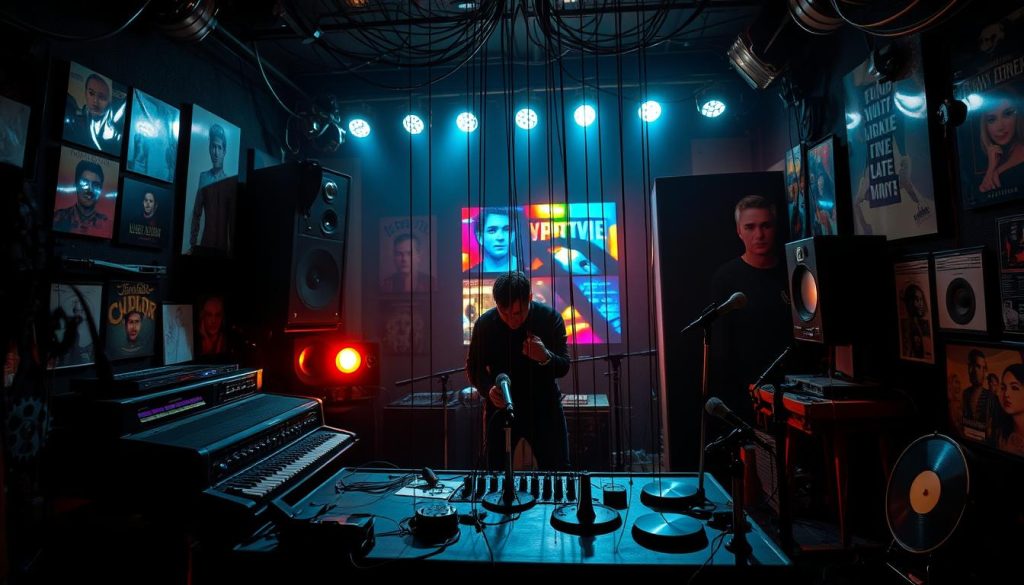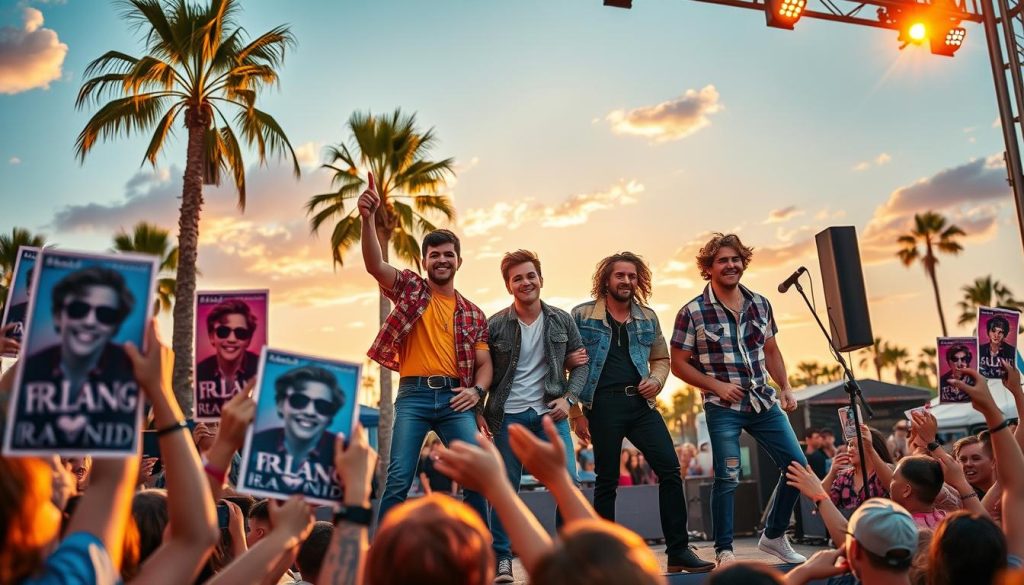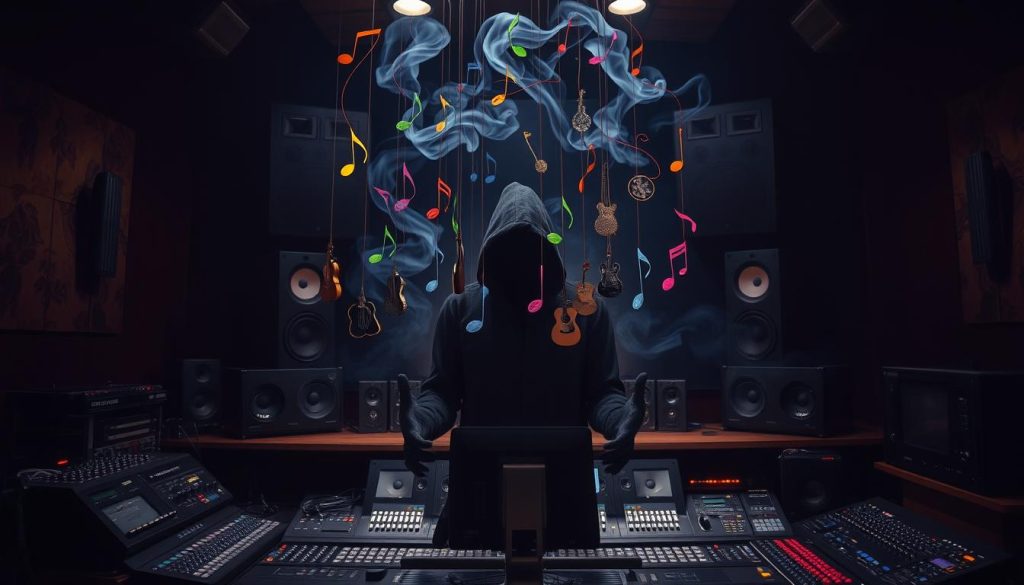The music industry has a dark secret. Major record labels control and manipulate artists for their own benefit1. They use their power to keep artists in check and make lots of money. This has changed the music world, making it all about money, not art.
Labels take most of the money from streaming, leaving artists with very little1. This unfair system has hurt many artists. It shows how the industry values money over creativity.
Key Takeaways
- Major record labels engage in monopolistic practices to control the music industry.
- Labels exploit aspiring artists’ dreams and suppress dissent to maintain their dominance.
- The true split of streaming revenue reveals that labels keep the majority of the profits, leaving artists with a small portion.
- The music industry conspiracy has transformed the industry, prioritizing corporate interests over artistic expression.
- Artists are speaking out against the industry’s manipulation and demanding changes.
The Rise of the Major Music Labels
The music industry is controlled by a few big labels with a lot of power2. These labels buy out smaller ones and control how music is shared2. They promise artists fame and money but trap them in bad deals2.
The Monopolistic Practices of Major Labels
Big music labels stop new ones from starting2. They grow by buying smaller labels, making it hard for artists to succeed outside their system2. This lets them make rules that artists can’t change, controlling their careers2.
How Labels Exploited Aspiring Artists’ Dreams
Big labels have been accused of using artists’ dreams for their own gain3. They promise artists fame and money but tie them up in bad deals3. This keeps the industry in their hands, stopping new ideas and chances for artists3.
“The major labels have turned the music industry into their personal playground, where they call the shots and artists are little more than pawns in their game of corporate dominance.”
The rise of big music labels has both helped and hurt the industry4. They’ve given many artists a chance to succeed, but their ways have hurt artists’ creativity and money4.
Orlando: The Epicenter of the Boy Band Craze
In the late 1990s and early 2000s, Orlando, Florida, became the center of the boy band craze. This was thanks to Lou Pearlman and his label, Trans Continental Records5. Pearlman started the ’90s boy band craze and managed acts like the Backstreet Boys, ‘NSync, O-Town, and the Chippendales5.
The Role of Lou Pearlman and Trans Continental Records
Lou Pearlman was key in creating and managing top boy bands of the time5. He was involved in a $300 million Ponzi scheme and filed for bankruptcy in 20075. He was convicted of fraud in 20085.
Pearlman used his power to lure people into his scams5.
The Making of NSYNC, Backstreet Boys, and O-Town
Pearlman’s label, Trans Continental Records, helped create NSYNC, Backstreet Boys, and O-Town5. After his scheme was exposed, hundreds of lawsuits were filed against him5. He was caught by FBI agents in Bali, Indonesia, while trying to escape creditors5.
Orlando’s abundance of aspiring performers and its distance from major music hubs made it perfect for Pearlman’s empire5. Investors unknowingly put money into worthless stocks and retirement accounts through companies like Trans Continental Airlines5.
Pearlman’s story has been widely covered, including in documentaries like “The Boy Band Con: The Lou Pearlman Story”6. A feature film about Nsync superfans is also coming6. His tale serves as a warning about the music industry’s dark side6.
The music industry conspiracy Exposed
The music industry conspiracy has been slowly uncovered. Major labels have been caught rigging charts and using industry payoffs. This shows their control over music. Artists and fans are now aware of these issues, leading to a shift in power.
Many incidents have fueled conspiracy theories. Famous musicians like Elvis Presley7, Tupac Shakur7, and Jim Morrison7 have died under mysterious circumstances. The assassination of John Lennon7 has also raised eyebrows.
The industry has been accused of taking advantage of new artists. Stories of unfair contracts and disproportionate payouts have surfaced. The truth about streaming revenue8 has also come to light, showing the industry’s unfair system.
Despite attempts to silence artists, the truth is getting out. The music industry conspiracy can no longer be ignored. People are demanding fairness and transparency.
The music industry conspiracy affects not just artists but culture as a whole. As the industry’s control weakens, a fairer future for music is possible. This future will let true talent shine, free from major label interference.
Unfair Contracts and Payouts to Artists
The music industry has long been criticized for its treatment of artists. Many artists feel they are not fairly compensated, even when their music makes millions for labels9. A report by Ernst & Young and SNEP has shown that labels take most of the streaming revenue, leaving artists with a small share9.
Revealing the True Split of Streaming Revenue
Spotify has paid out over $40 billion in revenue by 2022, with half a billion users9. Yet, the labels, not the artists, get most of this money9. This unfair split has left many artists feeling underpaid and undervalued in their life’s work.
Artist exploitation isn’t just a problem with major labels. Even independent artists and smaller labels face tough negotiations for fair terms, often being at the mercy of industry power.10 The lack of protection against false attribution and unauthorized use has caused financial and reputational harm10.
As the music industry grows, it’s key for artists to negotiate better contracts and get a fair share of their earnings. This way, the industry can truly value the immense contribution of artists and create a more just and sustainable environment for everyone.
“The meeting referenced in the letter had about 25 to 30 people in attendance, and the letter mentions that companies in the music industry had invested millions into the building of privately owned prisons.”11
The music industry’s exploitation of artists is a widespread issue, not just with major labels. The “kids for cash” scandal in Pennsylvania shows the industry’s focus on profits over ethics.11 It’s vital for artists to negotiate better contracts and get a fair share of their earnings as the industry evolves9.
Silencing Dissent: How Labels Suppressed Artist Uprisings
The music industry’s big labels have always used their power to quiet artists who question the norm12. Artists who speak out against unfair practices often face harsh penalties. These can include less promotion, fewer resources, and even losing their contracts13. This makes many artists afraid to speak up, keeping the labels in control.
Tupac Shakur is a clear example of this12. His music was bold, talking about politics and fighting against oppression12. Through his songs, he called for change and highlighted injustices12. But, the industry quickly pushed back, making his life harder and leading to his early death12.
The industry also fights over music lyrics, taking on artists in court13. Experts struggle to balance free speech and protecting kids’ values, all while facing First Amendment limits13. This shows how hard the industry works to control what music says and does.
But, the music industry’s spirit of rebellion lives on13. Artists keep finding ways to share their views and push for change13. Their fight for freedom and creativity keeps growing, making the industry’s efforts to silence them even more important.
The Lasting Impact on the Music Industry
The music industry conspiracy has deeply affected the music world14. Major labels’ power has stifled creativity and limited opportunities for independent artists14. This has led to a call for change, with artists and fans demanding fairness and transparency.
The conspiracy’s influence is seen across the industry. Hip-hop culture has grown, but so have the issues with the criminal justice system14. Rap lyrics have been used as evidence in court, a practice many see as unfair.
Initiatives like the Restoring Artistic Protection Act aim to protect artists from unfair court use of their work14. The song “Fight the Power” by Public Enemy won a Grammy in 2019, showing a shift towards valuing artistic integrity14.
The fight against the conspiracy has also led to scrutiny of major labels. In 2022, Young Thug’s lyrics were used as evidence in a criminal case14. This shows the ongoing use of artistic expression to target artists.
The conspiracy’s impact is huge. It has shaped the music world, affecting artists and fans. The industry is changing, aiming for fairness and artist empowerment.
| Statistic | Value |
|---|---|
| % of Americans who endorse at least one conspiracy theory (2015) | Approximately 50%15 |
| Relationship between education levels and belief in conspiracy theories | Research found that people with higher levels of education are less likely to believe in conspiracy theories15 |
| The impact of stress on conspiracy theory beliefs | Believers in conspiracy theories are more likely to be experiencing stressful situations compared to non-believers15 |
| Effect of politicians using conspiracy theories on public perception | Politicians, such as Donald Trump, utilizing conspiracy theories can lead to mobilizing support from the public15 |
| Influence of conspiracy theories on political engagement | People believing in conspiracy theories may become disengaged from mainstream politics and more inclined towards extremist views15 |
| Psychological perspectives on conspiracy theorists | Various reasons contribute to belief in conspiracy theories, with psychopathology and the need for a simple explanation being key factors15 |
| Influence of social media on conspiracy theories | Social media plays a significant role in perpetuating and spreading conspiracy theories, leading to the creation of echo chambers and reinforcing beliefs15 |
| Potential for debunking conspiracy theories | Fact-checking efforts, internet forums, and cultural representations can work towards debunking conspiracy theories and challenging false beliefs in society15 |
“The unchecked power of the major labels has stifled creativity, limited opportunities for independent artists, and created an environment that prioritizes corporate interests over artistic expression.”
Conclusion
The music industry has a dark secret. Major labels have been taking advantage of artists for years16. They use unfair contracts and control the system to make more money.
Artists face tough conditions, from low pay to being silenced. This shows the industry cares more about money than the talent it relies on.
Now, more people know about these problems. They want the industry to change for the better17. Artists need fair treatment and a say in their work.
We need a big change in how the industry works. Artists should be the main focus, not just a way to make money.
Changing the industry won’t be easy. But, we can make it fairer for artists. Your support can help make this happen.
FAQ
What is the music industry conspiracy?
How have major music labels risen to power?
What role did Orlando, Florida play in the boy band craze?
How has the music industry conspiracy been exposed?
How do the major labels treat artists?
How have the major labels suppressed dissent from artists?
What has been the lasting impact of the music industry conspiracy?
Source Links
- Musicians Vs. Spotify: Artists Who Have Joined Neil Young in Removing Their Music
- “The Secret Meeting that Changed Rap Music and Destroyed a Generation”
- How “industry plants” became the internet’s hottest conspiracy
- On… ‘industry plants’ and the false comfort of conspiracy theories – Music Business Worldwide
- Lou Pearlman, Orlando boy-band mogul, dies in prison
- The Boy Band Con: The Lou Pearlman Story (2019) – News – IMDb
- Music’s Craziest Conspiracy Theories
- < The Conspiracy Against Hip-Hop
- Spotify CEO explains issue of artists’ pay, says it’s “hard to change the narrative”
- On Copyright, Creativity, and Compensation
- #Page Title | #Site Title
- Hegemonic Resistance in Hip-Hop Music: a Gramscian Rhetorical Criticism of Tupac Shakur
- The Spiritual Temperature of Contemporary Popular Music REILLY
- Hip-hop and justice: Culture carries the spirit of protest, 50 years and counting
- The accidental invention of the Illuminati conspiracy
- Under Siege: Conspiracy, I-pistemology and Resistance Through Hip Hop in Killarmy’s Silent Weapons for Quiet Wars
- Music in the Digital Age: An Analysis of Declining Revenue in the U.S. Recorded Music Industry



